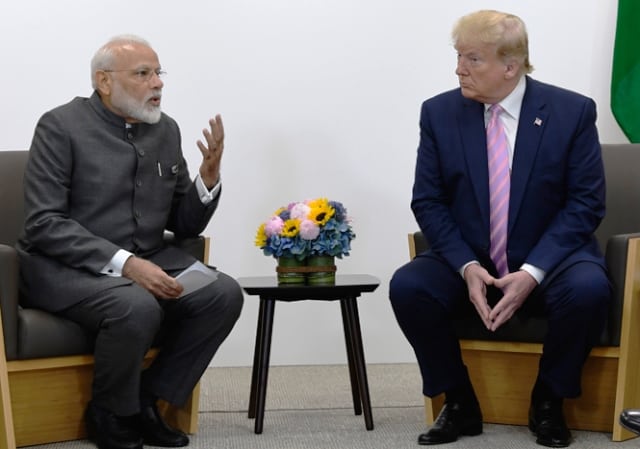
New Delhi Will Never Cede Its Strategic Interests
Will President Donald Trump’s obsession for reworking trade deals affect India-US ties? Is Trump ignoring the big picture for a quick fix solution to please his support base and losing the good will of new friends like India and old allies France and Germany in Europe?
The Modi-Trump meeting last week focused on both trade and Iran, two things uppermost in the US President’s mind at the moment. No breakthrough was expected on any of the niggling issues that has troubled ties between the two countries in recent months. But after all the hard work put in by Secretary of State Mike Pompeo and External Affairs Minister S Jaishankar to smoothen a bilateral platform, Donald Trump once again sullied the atmosphere.
The US President tweeted about high India’s high tariffs before leaving Washington for the G20 summit in Japan, where a meeting with Prime Minister Narendra Modi was scheduled: “I look forward to speaking with Prime Minister Modi about the fact that India, for years having put very high Tariffs against the United States, just recently increased the Tariffs even further. This is unacceptable and the Tariffs must be withdrawn!”
But India and the world is now used to Trump’s style of diplomacy, and taken this in its stride. Perhaps this is Trump’s way of putting pressure on Modi ahead of their meeting. Trump should know that Narendra Modi, now riding a popularity wave in India will obviously not be cowed down.
Pompeo’s trip to India was an attempt to smoothen the wrinkles in ties. Much of this has to do with President Donald Trump’s political message to his support base, to re-work trade ties and ensure that America is not taken for a ride. Meaning every other President before Trump has not bothered to look after America’s trade interests. In the process Trump has lumped Delhi with Beijing, though America’s trade deficit with India is a mere $24.2 billion (2018 figures), compared to $621 billion with China the same year. Putting India and China in the same bracket, as Trump keeps doing in his numerous tweets on trade issues is foolish to say the least.
The Trump administration increased tariff on aluminum and steel last year impacted India’s export to the US. India did not retaliate. Washington earlier this year ended the duty-free import from India under the Generalised System of Preferences (GSP). That was done in the middle of the election campaign. India responded recently by increasing tariff on 28 items, mostly agricultural products that it imports from the US. This has angered President Trump.
Significantly, Eliot Engel, Chairman of the US House Foreign Affairs Committee, wrote to Pompeo ahead of his Delhi trip saying that the Trump administration seemed to be coercing India on various issues instead of sitting across the table and negotiating with Delhi. As Engel pointed out, while most of the statements made about being defence partner and friends with India were all good, the administration’s actions did not match its laudatory comments. Both the Republican and Democrats support stronger ties with India.
In his public statements, US Secretary of State Mike Pompeo has made all the right noises to flatter and disarm India as Jaishankar prepared the groundwork for the Modi-Trump meeting.
In fact, the process started when Pompeo delivered a major speech at the India-US business forum ahead of his two-day visit to India. Pompeo quoted Modi’s election slogan “Modi hai tu Mumkin Hai.’ And translated it as “Modi makes it possible. I’m looking forward to exploring what’s possible between our two peoples.” Flattering Prime Minister Narendra Modi is a good way to start the dialogue.
But no one need be fooled by the sweet talk, as the US drives a hard bargain. Pompeo put enormous pressure on India to concede. The Secretary of State known as a hawk on Iran, is hoping to shore up support for the US position as war clouds loom over West Asia. He described Iran as the “biggest sponsor of terror”, a claim that Delhi certainly does not agree with. Iran came up for detailed discussion during his talks with Jaishankar. India raised the issue of oil supplies. Aware of the consequences of doing business with Iran, India has stopped buying oil from Tehran.
The good news is that the two sides are taking stock of the hiccups in relations and are ready to discuss them further. “On some outstanding issues related to trade, I pushed for a constructive and pragmatic view. The real test of our intentions will be our ability to deal with this,” Dr Jaishankar said, at a news conference with Pompeo after talks on Thursday.
But India has clearly drawn the red lines. On certain issues which affect India’s strategic interests there would be no compromise. That message has gone out clearly to Washington.
But it is not just trade. Political issues like Iran and purchase of S400 missile defence system from Russia goes against American interests. Jaishankar has made it clear that India will not change its stand on five billion dollar S400 purchase order from Russia.
Luckily, Washington does not hold all the cards. At a time when the US-China trade war is on and Trump’s aggressive stand on Iran and the threat of war which can disrupt oil supplies through the Strait of Hormuz is making all countries nervous. Prime Minister Modi is not just meeting Trump on the sidelines of the G20, meetings are also lined up with China’s Xi Jinping as well as a meeting of BRICS leaders, which means Russia’s Vladimir Putin and President’s of South Africa and Brazil. A Chinese official was also reported as saying that Xi will discuss US protectionist policies and how the world can counter this at the BRICS informal get together on the sidelines of G20. India and China, together with France and Germany are vocal critics of Trumps protectionist trade policies.
Modi’s meeting with Xi is important, and a Wuhan type of informal summit is being planned later this year in India. Perhaps as a signal to China, Jaishankar made the point. “We had also a talk of – over lunch on the Indo-Pacific. On the Indo-Pacific, the point – the big point I made was that the Indo-Pacific is for something, not against somebody. And that something is peace, security, stability, prosperity, and rules.” This is certainly India’s attempt to reassure China that Delhi is not ganging up with the US against Beijing.
In brief India-US relations are expanding in ways which were not conceivable in earlier decades. The momentum which began with the landmark civil nuclear deal is gathering speed. But India, much like the US will look out for its strategic interests and guard its space. America knows well that India is no push-over. India however also knows that having US on your side opens doors. The Modi government is looking to US for investments. So during negotiations localization of data, the new e-commerce rules that affect US companies like Amazon and Walmart, will come up for discussion. The US and India will agree on certain issues but not on all. There will be give and take on trade. The relations are on track yet there will be flare-ups now and then which Jaishankar and his MEA team will have to fire fight. Overall however ties are on course.



